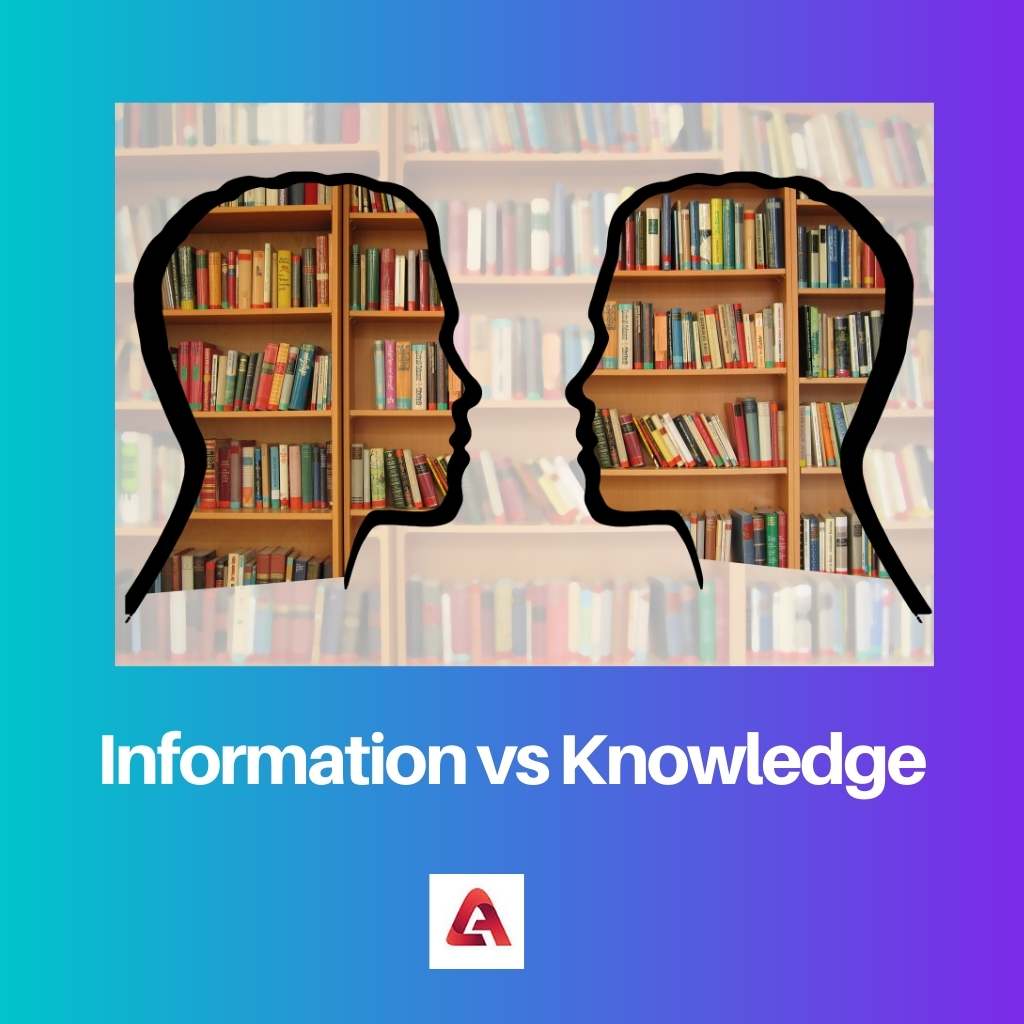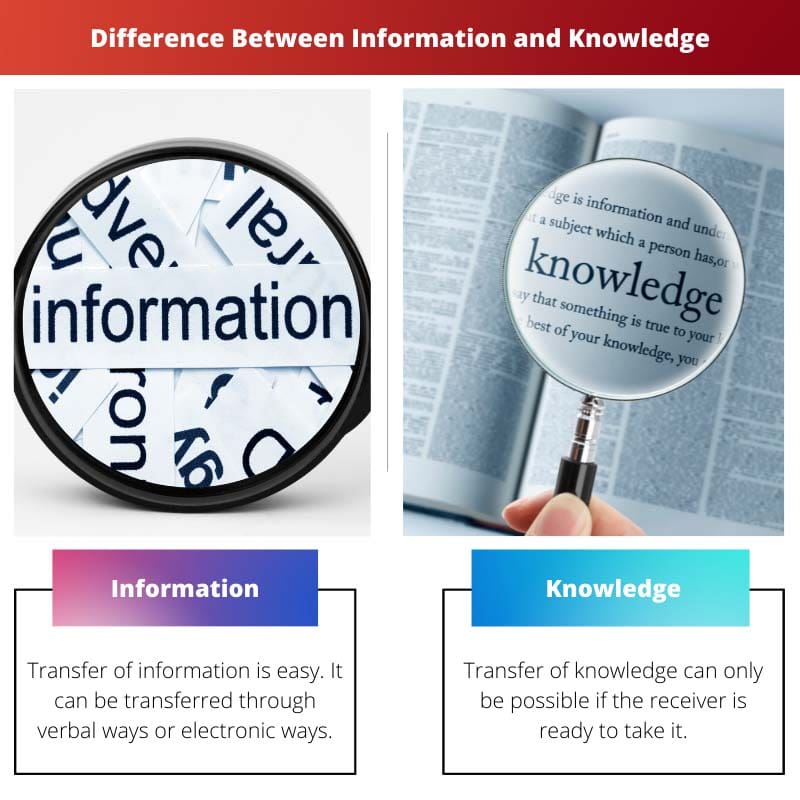The English language is sometimes typical to understand, and in order to use it in the correct way, one needs to know about the precise meaning of a word and, therefore, only could be predicted where it is to be used in the right manner.
Many words like enquire-inquire, hear-listen, and information-knowledge are used interchangeably, but when looked closely, they can change the meaning of the sentence.
Key Takeaways
- Information is data or facts arranged meaningfully, whereas knowledge is the understanding or comprehension of that information.
- Information is the raw material from which knowledge is derived, while knowledge results from processing that information.
- Information can be objective or subjective, while knowledge is always subjective and based on personal experience and interpretation.
Information vs Knowledge
Information is the knowledge obtained from a study, investigation, or instruction and is organized, processed, and arranged data. Knowledge consists of skills, facts, and information that have been acquired through education, experiences, perception, practice, testimony, inquiry, and memory.

Information is the organized, processed and structural data that is presented with a proper context for a better understanding of any subject or any matter.
It is further transformed into an intelligible form for a better and more precise decision-making process. Characteristics that define information are its relevance, accuracy and, last but not least, availability.
On the other hand, knowledge refers to a person’s awareness of any particular topic. Knowledge is gathered through experience, training, learning or even practical understanding.
Knowledge develops insights and draws interferences based on a person’s experience, which helps in decision-making and, finally, in taking action.
Comparison Table
| Parameters of Comparison | Information | Knowledge |
|---|---|---|
| Meaning | It is refined data. | It contains useful information. |
| Transfer | Transfer of information is easy. It can be transferred through verbal ways or electronic ways. | Transfer of knowledge can only be possible if the receiver is ready to take it. |
| Reproduction | Information can be reproduced. | Knowledge is hard to reproduce. |
| Prediction | Information alone is not helpful for making predictions. | Prediction is possible if the learner has proper knowledge. |
| Outcome | Comprehensive | Understanding |
What is Information?
Information could be defined as the knowledge obtained from investigation, study, or instruction and knowledge is used interchangeably without even realizing their differences.
In a general sense, a piece of information is processed, organized and structured data. It enables decision-making and provides context for data.
It can also be regarded as organized data about a thing or a person obtained from various types of sources, which include verbal ways or electronic ways like Television, newspapers, media etc.
Data compiled in meaningful sentences is known as information. For example, all the data, material, concepts, and rest of the things given in books, videos, newspapers, etc., are pieces of information procured from a source and provided to you.
Everything that comes back as an answer to a query searched on the internet is information, and it will not become knowledge until and unless someone reads it, understands it and memorizes it.
Information is a building block for anything. Information is knowledge that is remodelled in an intelligible type. Information is basically a combination of context and data.
But it is not helpful in taking decisions or came on to a conclusion. After conversion, when knowledge is refined and becomes purposeful, it becomes information.
It can even be reproduced and presented in the form necessary for a particular discussion, explanation, presentation, etc.

What is Knowledge?
Knowledge is the acquired facts, information, and skills through experiences or education. It could also be defined as a subject’s theoretical or practical understanding.
It can be acquired in a variety of ways and from different sources, including but not limited to perception, reason, memory, testimony, scientific inquiry, education, and practice.
Whenever someone reads a book, watches an informative video, or attends a lecture; all the things that he or she understands and retains are regarded as knowledge.
Just reading something or listening to a piece of information without understanding it completely is not considered knowledge since, when asked later, the person cannot recall it and give a correct explanation or state it as it was mentioned in the original and right form.
Knowledge shows the familiarity with a person or place or anything that we gained through learning, practice, experience or experiment. A mixed form of intuition, information and expertise formed knowledge.
It helps in the decision-making process. And for any judgement, one needs familiarity with the subject they are supposed to discuss.
Information is the processing of data, and when the information is further manipulated and processed, it will convert into knowledge.

Differences Between Information and Knowledge
- Information is the building block for everything in this universe, while knowledge can be regarded as a whole building that is properly processed and refined.
- Data compiled in a meaningful context provides information, and when the information is further combined with various other factors like experience, conscience or intuition, it then converts into knowledge.
- The information provides the comprehensiveness of facts, while knowledge leads to understanding a subject.
- Information can be easily transferred through various ways, verbal or non-verbal. But the transfer of knowledge is totally based upon the interest of the receiver.
- Information can be done at a low cost, while the process of knowledge is rather costly as it requires experimentation.


The comparison table provides a clear distinction between information and knowledge. This has helped me comprehend the disparities between the two.
Both information and knowledge are extremely important but misunderstood. It’s crucial to be aware of the differences as they affect how the data is perceived and used.
Absolutely correct, wwood. The usage of information and knowledge in the right context can make a huge difference in various aspects of life.
This detailed explanation about information and knowledge has changed my entire perspective. It’s fascinating how the two concepts differ in terms of usage and value.
The comprehensive explanation about information and knowledge provided here is enlightening. It serves as a well-structured guide for those looking to discern the differences between the two.
Information and knowledge are indeed closely related but distinct concepts. The explanation provided here offers a comprehensive understanding of their individual significance.
Well said, Roberts Alice. It’s wonderful to have such detailed insights that strengthen our understanding of these vital elements.
I couldn’t agree more with your observation, Alice. The content here serves as an excellent reference for differentiating between information and knowledge.
Highly appreciative of this article’s seamless comparison between information and knowledge. The informative narrative not only educates but also engages readers through its compelling structure.
Absolutely, Scarlett. The content’s ability to cater to both informative and engaging facets makes it an exemplary source for comprehending the intricacies of information and knowledge.
Your assessment is spot-on, Scarlett. The article provides a thought-provoking exchange of pertinent information that enhances our discernment of these two concepts.
These key takeaways are essential in understanding the varying nature of information and knowledge. I believe this content should be shared to increase awareness about these concepts.
This article draws informative distinctions between information and knowledge. The meticulous detail and clarity in the content make it an invaluable resource for gaining deeper insights.
I appreciate the effort put into outlining the differences between information and knowledge. This article provides valuable insights for anyone seeking clarity on these concepts.